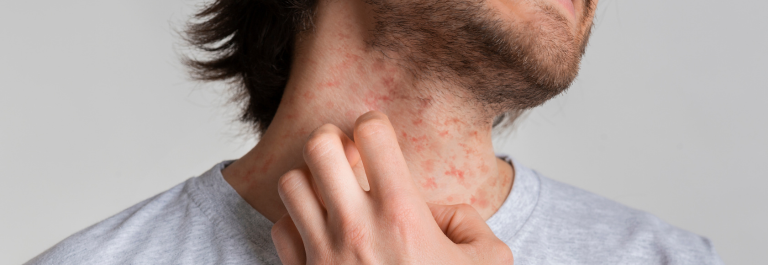Eczema affects more than 31 million Americans today, impacting people of all races and ethnicities.
We know that eczema tends to be more common amongst African American patients, people of Hispanic heritage, and Indigenous peoples, with symptoms of darker skin tones differing from white skin. The Skin of Color Society reports that eczema is the second most frequent skin disease to affect African Americans.
Throughout this post, we're going to cover everything you need to know about:
-
The leading causes of eczema
-
The most common eczema symptoms for people with darker skin tones
-
How best to treat and manage your eczema naturally
Keep reading to learn more about how eczema flare-ups impact skin of color and how best to nourish and pamper your skin back to health today.
What is Eczema?
Eczema is an umbrella term used to describe a set of chronic skin conditions, including atopic dermatitis, contact dermatitis, seborrheic dermatitis (or dandruff), hand eczema and dyshidrotic eczema, among others, which tend to develop during early childhood.
While there is no exact cause for eczema, research has shown that eczema flares are triggered by a combination of genetic and environmental factors, causing a weakened skin barrier that is less able to retain moisture and is highly sensitive. A family history of eczema is one of the main risk factors associated with this skin disease.
Exposure to environmental irritants and allergens may trigger an overactive immune system response in people with eczema, provoking intense itching, skin inflammation, and skin thickening.
Symptoms of Eczema on Melanin-Rich Skin
Due to bias and underrepresentation, many descriptions of eczema symptoms tend to recount eczema on white skin - red, swollen, raw and maybe even weeping. Physicians have often been primarily trained to diagnose eczema on lighter skin tones, meaning that people with black or brown skin may go undiagnosed.
With this in mind, it's essential to recognize that not only does eczema manifest differently on dark skin, but you might also experience additional symptoms. Let's outline the key things to look out for:
-
Intensely itchy, dry skin patches appear thicker and darker than the surrounding skin. Eczema patches may appear brown, ashen grey, purplish, or red, sometimes causing a permanent change in your skin pigmentation across the affected area.
-
In the case of severe atopic dermatitis, dry skin may crack and bleed.
-
Small bumps (called papular eczema) that develop across your arms, torso, and legs.
-
Follicular accentuation - small spots surrounding your hair follicles may appear like goosebumps.
-
People with a darker skin tone are also more prone to developing dark circles around your eyes as part of eczema flares.
How To Treat Eczema for Dark Skin
Conventionally, eczema treatment tends to be centered around medical interventions such as topical corticosteroids. But what if you want to manage your skin condition naturally?
There are many gentle skin care steps you can take to heal your skin's barrier, no matter your skin color, alongside the help and guidance of your healthcare professional or board-certified dermatologist.
Moisturize
Eczema impacts your skin barrier's ability to hold and retain vital moisture, leading to dry, itchy skin. Therefore, you must aim to boost your skin's hydration levels using a nourishing, fragrance-free emollient.
We recommend the eczema cream Baby & Adult Soother, made from just three Chinese herbs in a base of olive oil and beeswax to soothe all dry skin conditions. Safe for babies and effective for adults, rub this creamy balm into your affected skin to find fast relief from eczema, keratosis pilaris, and rosacea-like redness.
Moisturizers also help to provide a protective barrier against environmental irritants such as pollen, cigarette smoke, and other allergens, preventing flare-ups.
How To Prevent Eczema in Skin
Breathable Clothing
Particularly in the case of contact dermatitis, you might notice that your synthetic or tight clothing triggers severe eczema flares.
To help manage eczema, we recommend finding clothes made from hypoallergenic, soft, breathable fabrics to help reduce the risk of flares across all skin types.
For your little ones, the Cotton ScratchSleeves Baby Eczema Pajamas will help your baby stop scratching and get a proper night's sleep. Alternatively, Remedywear™ (TENCEL + Zinc) Long Sleeve Shirt and Remedywear™ (TENCEL + Zinc) Pants have been made with a super, soft silk-like fabric that is moisture-wicking and cooling. These incredibly lightweight, soothing garments are made from eco-friendly, breathable TENCEL and embedded with anti-inflammatory zinc, helping protect your itchy skin from further irritation.
Combat Eczema on Darker Skin Types Today
Follow these tips to help you spot the early signs of eczema on skin of color sooner, treating your atopic eczema naturally and effectively today.


